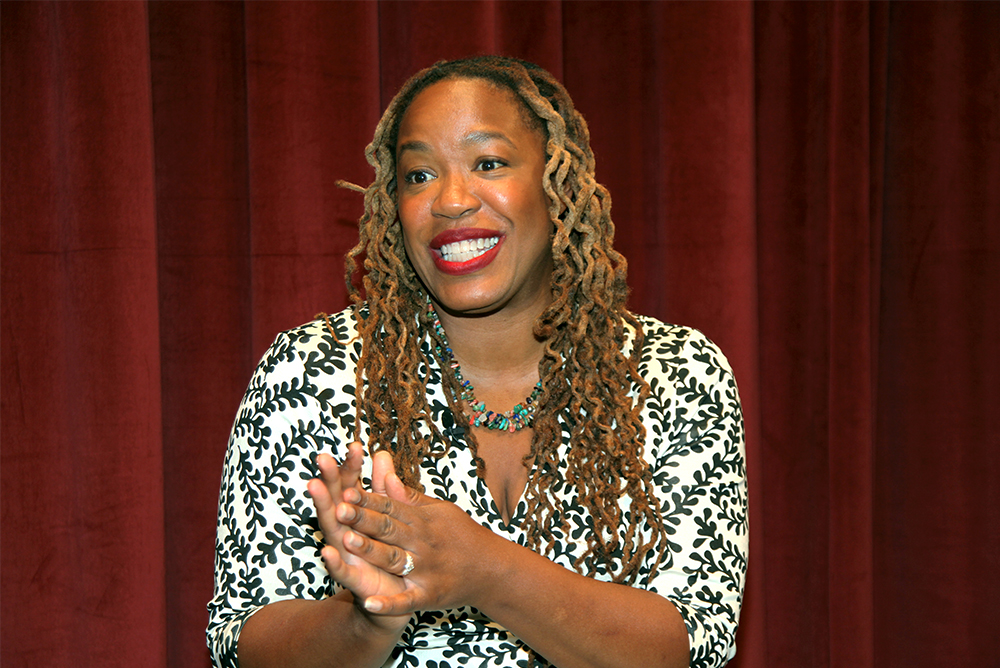
Photo by Aaron Salcido.
Heather McGhee is the former president and currently a trustee emeritus of Demos, a non-profit progressive U.S. think tank. The 12th annual winner of the Zócalo Book Prize for The Sum of Us: What Racism Costs Everyone and How We Can Prosper Together, McGhee joined us in the green room to chat about historical oddities, throwing parties, and Viking women before delivering the 2022 Zócalo Public Square Book Prize lecture.
You’ve spoken about your love of theater growing up. What’s your favorite show?
When I was a kid, my favorite show was Les Mis. I listened to the tape over and over and over again. I listened to it in French. I knew every word. That was definitely my favorite.
What is your hidden talent?
Party planning. I love to plan parties. It’s a little bit of a liability sometimes. Today, for example, my dad and stepmother flew down from Northern California. And my husband and my son and I flew from New York. And I’m just sort of always thinking about the logistics and making sure that, you know, we met somewhere great for lunch. And then we could get into the pool… I’m always trying to sort of curate a nice experience for people.
What is the best party you’ve ever thrown?
The best party I’ve ever thrown was for my 40th birthday, which was in New Orleans last year—although it was deferred a year for the pandemic. It was about 25 people, a lot of social justice movement folks—my friends in the fight—people who have been really going through it over the past couple of years, and I felt like needed a party. Those people are often also the most intense partiers I’ve noticed in my life. And so we rented this big house that had nine bedrooms, and nine bathrooms, and there was a pool inside. It was rundown but amazing in the way that New Orleans is, and it was just like this epic, long weekend, and it was right after everyone had gotten their second shot of the vaccine and before Delta, and so it was that moment where it was like, oh, we did it, and now we can leap back into life. And we did it, and nobody got sick.
You were an American studies major at Yale. What’s your favorite historical oddity that you remember learning?
During the Depression, there were dance marathons. So one of the foundation classes in this major is called the formation of American culture, which is a great class—just thinking about why the culture is telling itself this story at this time. What does this piece of music or phenomenon or game or piece of literature say about the deeper societal story at the moment? So during the Depression, there were things called dance marathons, where people would just dance, and dance and dance and dance until they dropped. And you would do it for money, and you would do it for fun, and it was something kind of egalitarian that anybody could do, as long as they were able. I just remember seeing pictures of it, and just thinking that it was so fascinating.
What’s your favorite guilty pleasure?
I really like all the Viking television shows. Vikings, which started on the History Channel and The Last Kingdom and there’s probably another one in there. I just really enjoy a swashbuckling battle scene. It’s kind of like indigenous white people—it’s really interesting; it’s just a whole other culture. I haven’t seen Norsemen, but the whole kind of resurgence of interest in Viking culture is probably a guilty pleasure. It’s very cool. And you know, the women are all warriors. You don’t realize until you see it how much you want to see it.
Zócalo is always thinking about place. Outside of your own home, is there a place you go that makes you feel most at home?
For the past 15 years my mother has lived in Maryland on this property that’s almost four acres. And it’s now a retreat center. I go to it at the end of the book. And that place, it’s surrounded by forests. There’s a pond. And it just very much feels like my mother—like her energy is diffused in all of it.
We’re here to celebrate your book, but we’re curious, what’s the last book you read that you loved?
I just read the galley of my friend Donovan Ramsey’s book that is not even out yet, When Crack Was King. Donovan is a beautiful writer. The people are just unforgettable. He really humanizes it, and then also really makes the argument that the Black community without a lot of help sort of beat it in a way that really reminds the reader of the community’s resilience and strength and sort of challenges the pathology narrative of it at that time.



